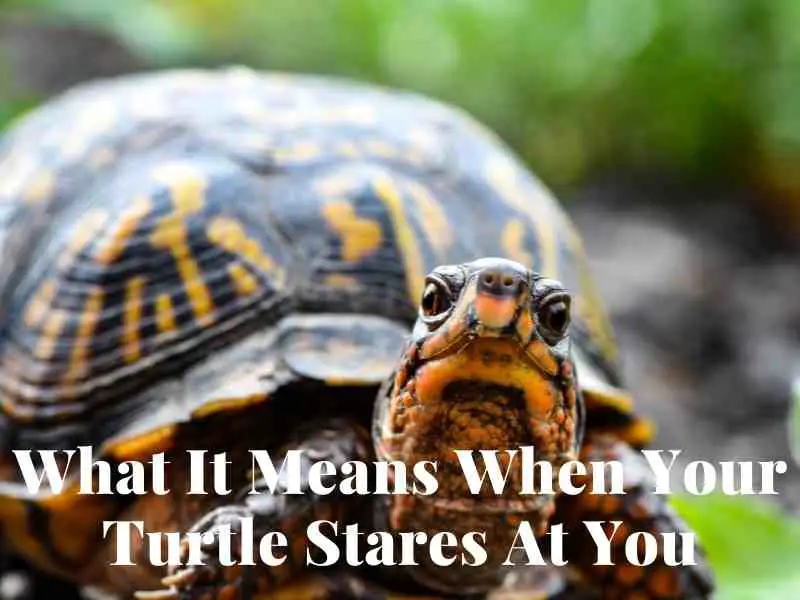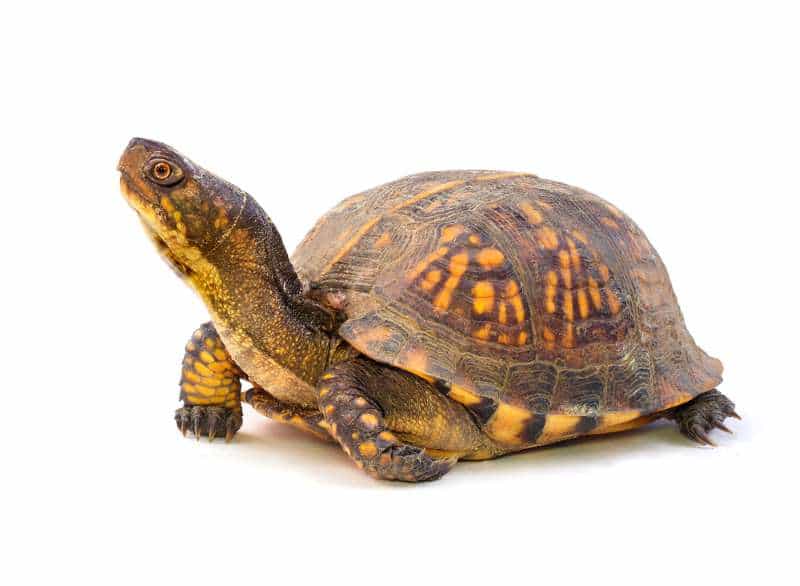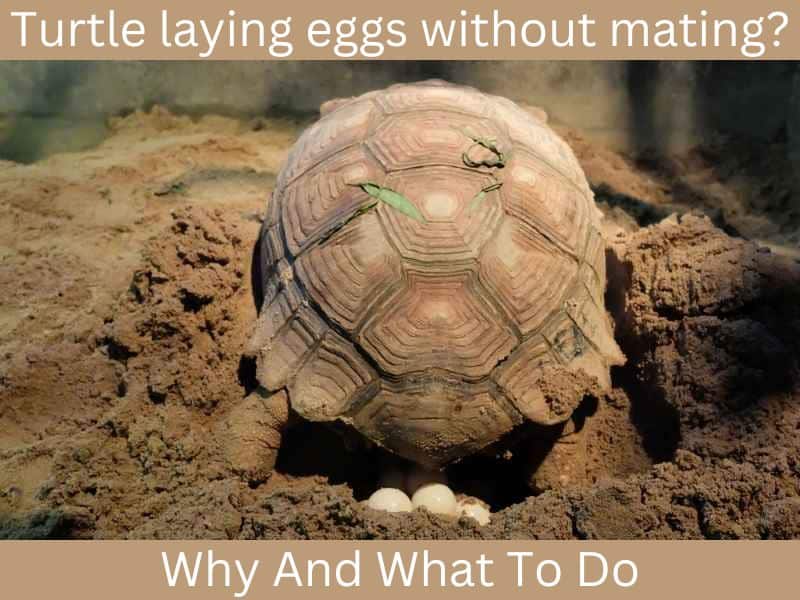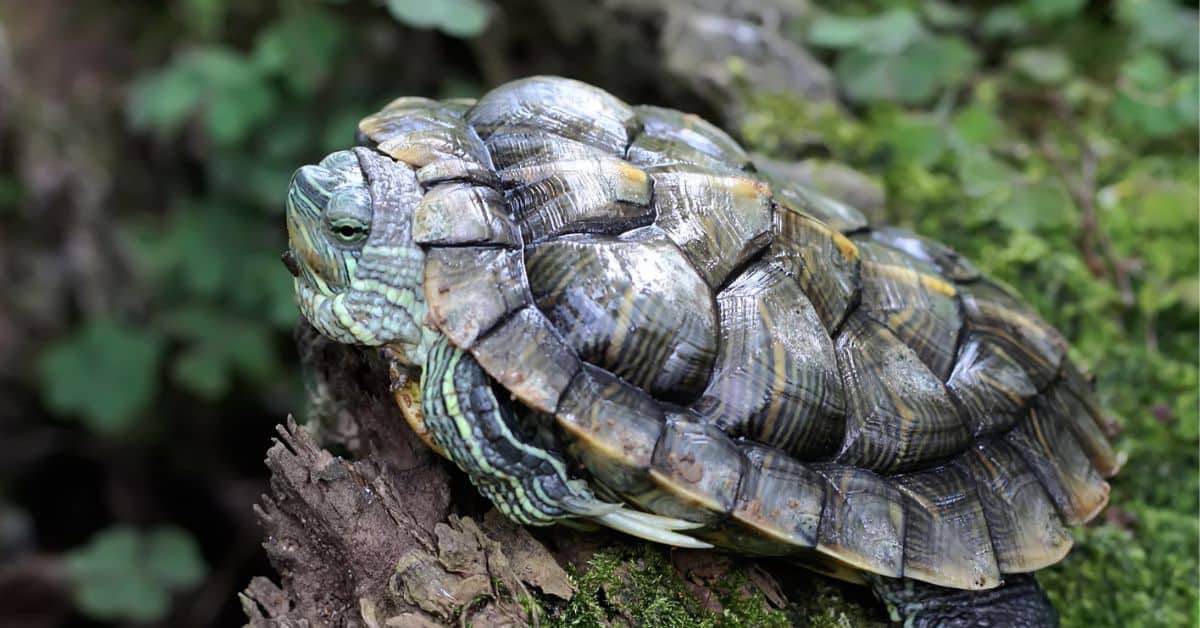Turtle Staring: What Does It Mean When They Stare At You?

Staring contests might be fun when played between humans, but when a pet reptile stares directly at you, you may start to wonder: what does it mean when your turtle stares at you?
Turtles are intelligent enough to recognize human faces, and may stare to communicate hunger, welcome, or discomfort when looking at their owners.
This adorable fact could benefit from some more information! In this article we’ll go over why turtles lock eyes with humans or suddenly look away, the possible meanings behind this, and the ways to determine whether or not this is good luck!
Contents
What it Means When a Turtle Stares At You
If you come into a room, approach your turtle’s tank, and find it staring straight at you, it can be a little unnerving. However, there are some reasons behind this to be aware of that might help you not only regain peace of mind, but appreciate your little pet even more.
The main reason for a turtle’s fixed gaze is that it is smart enough to recognize you!
Because a turtle’s face is not quite as expressive as a cat’s or dogs, and because it’s whole body moves with much less animation, some can make the mistake of believing their turtle doesn’t have very many thoughts floating around in it’s adorable head.
Turtles are very intelligent, and over-time, they can recognize their owner enough to stare at you!
Turtles have been researched often enough to prove that they can not only remember experiencing how you care for and treat them but also learn from those same encounters.
For example, the red-footed tortoise can learn a specific color and then associate that with a corresponding food item. Researchers found that if the tortoise was shown a red piece of paper, it would know that it was about to be fed mango instead of the other fruits, and it could retain this knowledge more than a year later.
While tortoises do have longer memories than the turtles that are commonly kept as pets, their intelligence levels aren’t too different from one another. Florida Red-Bellied Cooters were similarly able to be trained to find food in a maze, while box turtles in the wild are known to remember vast areas of terrain to find mating spots or favorite watering holes.
If turtles can do this much, you can bet safely that they know who you are after a few encounters, especially if you’re the one bringing in food and water.
Therefore, a turtle may simply be staring at you because it knows you and knows that you’re the person responsible for giving it good things like snacks, drinks, and even occasional pettings!
Why A Turtle Stares For So Long
So if a turtle recognizes you, what is the point of the length of it’s stare? Some owners report turtles locking their gaze onto humans for longer than thirty seconds!
Don’t worry, your turtle isn’t staring you down because it wants to fight. Most species of turtle display aggression by ramming, biting, or simply head-butting one another.
The length of a turtle’s stare might seem strange to you or me, but remember, we need to blink about 20 times a minute. That means we’re blinking over 14,000 times each day. In contrast, most species of turtles only blink around 170 times a day. Turtles might look at you for long periods of time without blinking just because they don’t need to blink!
Remember that your turtle likely knows who you are and is smart enough to enjoy watching you.
Why A Turtle Looks Away Or Down When You Notice It Staring
Some pets view eye contact as a form of aggression. If you own or have friends who own a pet cat, you may have noticed that the kitty doesn’t want to look you in the eye. This is the animal basically communicating that it’s not looking for trouble!
However, as previously stated, a turtle doesn’t stare to communicate anger or intimidation. When it watches you, it’s simply doing so out of curiosity, expectation of food, or even affection. Therefore, if you look at your turtle and it looks away, it’s not because it is embarrassed to be caught staring or trying to avoid conflict!
More often than not, if a turtle happens to look down or look away when you look at it, it is simply because your turtle found something else interesting.
How To Tell If Your Turtle Is Happy
There are a few ways to tell that turtles are happy. Check the list of happy turtle traits below so that you can enjoy making your reptile friend happy!
- Eager – A turtle displays eagerness to eat when it is living the good life. When you carefully offer your turtle food, it should move quickly over to you and take big, excited bites. This is a sign that your turtle feels pleased and secure.
- Playing With Water – If your turtle is excited or happy and also happens to be aquatic, you’ll know by the splashing water! A swimming turtle may communicate it is pleased to see you by getting your attention with happy sloshing around.
- Chasing Food – A depressed, anxious, or sick turtle won’t engage in the natural behavior of hunting. A happy one, on the other hand, will charge after fish and bugs with a zeal for life!
Does a Turtle’s Stare Mean It Loves You?
The exciting answer to this question is, yes, most likely! Your turtle not only associates you with everything good and helpful in its life, but is smart enough to genuinely enjoy watching you move around the room. Some pet turtles will not only follow their owners with their eyes, but will follow them literally, given the chance. Turtles pay attention as a way of showing affection.
In Conclusion
In conclusion, your turtle’s staring is not an act of aggression. Instead, a staring turtle means that your smart little reptile has learned to recognize you, associate you with good things, and even loves you! Since turtles are known to bring good luck, this is one more reason you should enjoy the pet you have, even if it does tend to stare sometimes.




